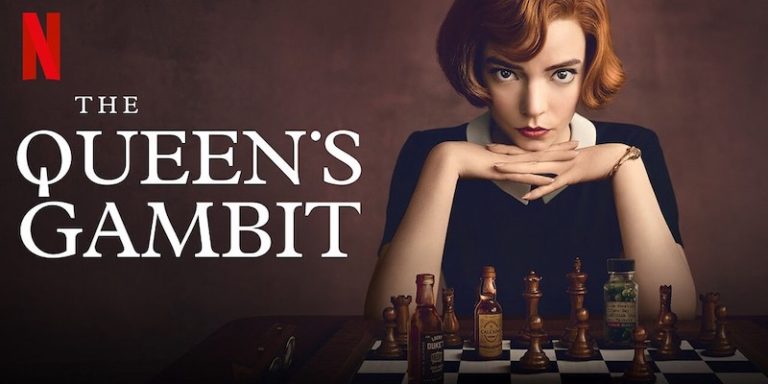7 Screenwriting Lessons From THE QUEEN'S GAMBIT Creator Scott Frank

What can Scott Frank — and his acclaimed Netflix show The Queen's Gambit — teach screenwriters about the art, craft, and business of screenwriting?
Scott Frank has been a prolific and iconic Hollywood screenwriter since the 1990s. His screenplays include:
- Little Man Tate
- Dead Again
- Malice
- Heaven’s Prisoners
- Get Shorty
- Out of Sight
- Minority Report
- The Interpreter
- The Lookout (also directed)
- Marley & Me
- The Wolverine
- Walk Among the Tombstones (also directed)
- Logan
- Netflix limited series Godless (also directed)
- Netflix limited series, The Queen's Gambit (creator)
His films have been nominated for multiple Academy Awards and Writers Guild Awards. Out of Sight won the Writers Guild Award for Best Adapted Screenplay, and his directorial debut, The Lookout, won the Independent Spirit Award for Best First Feature.
Godless was nominated for a Directors Guild Award for Best Directing in a TV Movie or Miniseries and a Writer’s Guild Award for Best Writing in a TV Movie or Miniseries.
His new Netflix limited series, The Queen's Gambit, reached 62 million households for the first 28 days of release, making it Netflix’s most popular scripted limited series ever. It also has a 99% rating on Rotten Tomatoes.
Here we pull seven pieces of Frank's best screenwriting insight and advice from two video interviews with him, and then add our own elaboration on the wise points he makes.
10 Screenwriting Lessons from the Creator of THE QUEEN'S GAMBIT
1. Check Your Expectations at the Door
"There's stuff you work on that you think is going to turn out to be really important. You think it's just going to be a major deal. And they turn out to be nothing... And then there are other things you do just because you had to, and you have no expectations for them. In the case of Out of Sight, I wrote that because we had three kids all sleeping in the same room, and I needed a job to buy a house in Pasadena. The Queen's Gambit was a book I just loved. And I didn't think anybody would make it, and I was shocked that Netflix was 'dumb' enough to do it."
Expectations don't matter. In your screenwriting career, you will have those projects that you believe are sure things — and they'll go nowhere. Then you'll have those screenplays that just manage to become lightning in a bottle for you and your career.
Sure, Frank has a lot of Hollywood pull to get a limited series like The Queen's Gambit (which he also directed) made. But the point is that the expectations that you attach to your screenplays don't matter. Just write it. And write it well. Everything else will fall into place.
Having high expectations can destroy you at times. But keeping those expectations in check and just focusing on the writing is what will help you most in the long run.
2. Deliver an Emotional Climax
"Deliver an emotional payload at the end because that's what we really want. It's not just exhilarating. It's something that is emotional on top of that. You can't just say, 'You're supposed to feel emotional here.' You need to feel it. And there's a difference between an audience understanding what they are supposed to feel and actually feeling it."
Catharsis is the greatest accomplishment a screenwriter can reach in their screenplays — where the script can have the reader or eventual audience coming out of that read/viewing feeling emotionally moved.
It's not enough to just present what should be an emotional moment. You have to write the script in a way that the reader and audience can feel those emotions through a vicarious experience. People see the world through your characters and their experiences, so you need to write to explore the characters' emotions and why they feel this way or that amidst dealing with the conflict of the story.
3. Screenwriting Is a Gut Thing
"Storytelling and yarn spinning — and this goes back to [William Goldman] — it's in your gut... It's a gut thing."
There's only so much that you can learn by turning to others to tell you how to write an effective cinematic story. Nobody can really teach you how to do that. You can't learn the core of screenwriting from books, seminars, script coverage, peer feedback, and interviews with successful screenwriters. You need to hone your craft and trust your gut as a storyteller.
Yes, outside sources can give you tools, inspiration, and avenues to follow towards success. But in the end, it's just about you, that blank screen, and your gut. Trust it. Get to a point where you don't need to turn to others. Learn the basics. Learn the general guidelines and expectations. And then work from your years of watching amazing movies and TV shows. Trust your gut.
4. All Characters Should Be in the Grey Area
"Every character has to be in the grey area. They are not all good. They are not all bad. And I think that's hugely important. Your [protagonist] needs to be complicated, and your antagonist needs to be complicated."
Many screenwriters seem to struggle with how to create compelling characters. It's actually not that difficult. What makes it easier is creating flawed characters for your protagonist. Give your "hero" flaws. That is where The Queen's Gambit works so well. The protagonist is utterly flawed throughout each episode. She's sometimes her own worst enemy. She battles drug addiction and psychological struggles from her past upbringing. She's non-committal with the men she dates. She's not willing to change her harmful ways to accommodate them and their relationships.
Yet she's doing amazing things. She's a good person. She's representing her gender in a male-dominated world. And she's managing to defy all odds while doing so. But she's utterly flawed — which makes her a compelling character to watch.
5. Grief/Anger/Drunkenness in Screenplays Gets Old Fast
"There are three things that get old fast — grief, anger, and drunkenness. It gets old super fast. Watching people grieving too long, you're like, 'Okay, enough.' Watching people being angry for too long, you're like, 'Okay, enough.' And watching people just getting stoned or drunk or whatever, over and over and over, you're like, ' Okay, I got it. I get it.'"
He points to the fact that screenwriters use these things as a crutch in their screenplays. They think grief, anger, and drunkenness equals character depth. It's not. It needs to come from something real. It needs to come from flawed characters and how they deal with actual conflict, issues, and problems presented with the story.
Things like shame and guilt are real. Those emotions can come from realistic conflicts, issues, and problems within the script. That's how you create true emotion and depth. Grief, anger, and drunkenness can't be used as crutches for character depth. They need to come from some inner struggle that the character is dealing with.
6. Embrace the Style, Form, and Tropes of the Genre You're Writing
"When I write in a genre, it's because I love the genre. So I want to lean into all the tropes. I want to lean in on everything and embrace all of the cliches from that particular genre. But try to do them differently. Try and put some sort of spin on them or use them in a different way. Or add another element or value to the genre that isn't there."
Genre styles, forms, cliches, and tropes are there for a reason. Audiences are comfortable with them. They can enjoy the genre despite knowing what's going to be part of that experience.
The secret is to play within that genre's sandbox. Use the tools and toys. Bend and shape things that audiences are familiar with and make them your own. Make them different. Tackle them from an angle that hasn't been done before. Add something special to the mix that you normally wouldn't see.
7. Don't Be Too Precious or Overprotective When Adapting Material
"What you learn very quickly is loving the book is a two-edged sword in that you tend in your adaptation to overprotect the material. And you're too careful with it. And what you end up with is a very trivialized version of the book instead of a movie. And you have to decide is what is the movie about for you? You're trying to find your way through. What is [the movie] about for you. Otherwise, you're trying to do too much. And if you try to protect all of the book, you end up with none of it."
Here's a perfect example. Sometimes when a fan is defending a lackluster adaptation of a book, they'll say things like, "Well, if you read the book, you'll understand that..."
No. The movie — or series — is its own entity. It has to exist on its own merit. And that falls on the screenwriter. When you adapt a novel, you need to seek out the type of cinematic story you want to tell. You can't accomplish that without pushing aside certain elements of the book that don't fit within that narrative.
So when you're adapting a book into a movie or TV series, focus less on adapting every aspect of the book and, instead, focus on finding elements within the book that match with what you're trying to do within your screenplay adaptation.
CLICK HERE TO WATCH THE WHOLE SUNDANCE COLLAB VIDEO!
Ken Miyamoto has worked in the film industry for nearly two decades, most notably as a studio liaison for Sony Studios and then as a script reader and story analyst for Sony Pictures.
He has many studio meetings under his belt as a produced screenwriter, meeting with the likes of Sony, Dreamworks, Universal, Disney, Warner Brothers, as well as many production and management companies. He has had a previous development deal with Lionsgate, as well as multiple writing assignments, including the produced miniseries Blackout, starring Anne Heche, Sean Patrick Flanery, Billy Zane, James Brolin, Haylie Duff, Brian Bloom, Eric La Salle, and Bruce Boxleitner, and the feature thriller Hunter’s Creed starring Duane “Dog the Bounty Hunter” Chapman, Wesley Truman Daniel, Mickey O’Sullivan, John Victor Allen, and James Errico. Follow Ken on Twitter @KenMovies
For all the latest ScreenCraft news and updates, follow us on Twitter, Facebook, and Instagram.
Tags
Get Our Screenwriting Newsletter!
Get weekly writing inspiration delivered to your inbox - including industry news, popular articles, and more!






















